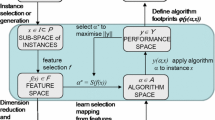Abstract
This paper proposes considering version spaces as an approach to reliable instance classification. The key idea is to construct version spaces containing the hypotheses of the target concept or its close approximations. So, the unanimous-voting classification rule of version spaces does not misclassify; i.e., instance classifications become reliable.
We implement version spaces by testing them for collapse. We show that testing can be done by any learning algorithm and use support vector machines. The resulting combination is called version space support vector machines. Experiments show 100% accuracy and good coverage.
Access this chapter
Tax calculation will be finalised at checkout
Purchases are for personal use only
Preview
Unable to display preview. Download preview PDF.
Similar content being viewed by others
References
S. Bay and M. Pazzani. Characterizing model errors and differences. In Proceedings of the Seventeenth International Conference on Machine Learning (ICML-2000), pages 196–201, 2000.
C. Blake and C. Merz. UCI repository of machine learning databases, 1998.
C. Burges. A tutorial on support vector machines for pattern recognition. Data Mining and Knowledge Discovery, 2(2):121–167, 1998.
H. Hirsh, N. Mishra, and L. Pitt. Version spaces and the consistency problem. Artificial Intelligence, 156(2):115–138, 2004.
S. Keerthi and C.-J. Lin. Asymptotic behaviors of support vector machines with gaussian kernel. Neural Computation, 15:1667–1689, 2003.
M. Kukar. Transduction and typicalness for quality assessment of individual classifications in machine learning and data mining. In Proceedings of the 4th IEEE International Conference on Data Mining (ICDM-2004), pages 146–153, 2004.
T. Melluish, C. Saunders, I. Nouretdinov, and V. Vovk. Comparing the Bayes and typicalness frameworks. In Proceedings of the 12th European Conference on Machine Learning (ECML-2001), pages 360–371. Springer, 2001.
T. Mitchell. Version spaces: an approach to concept learning. PhD thesis, Electrical Engineering Dept., Stanford University, Stanford, CA, 1978.
T. Mitchell. Machine learning. McGraw-Hill, New York, NY, 1997.
K. Murray. Multiple convergence: an approach to disjunctive concept acquisition. In Proceedings of the Tenth International Joint Conference on Artificial Intelligence (IJCAI-87), pages 297–300, Los Altos, CA, 1987. Morgan Kaufmann.
I. Nouretdinov, V. Vovk, V. V’yugin, and A. Gammerman. Transductive confidence machine is universal. Technical report, Department of Computer Science, Royal Holloway, University of London, 2002.
M. Sebag and C. Rouveirol. Resource-bounded relational reasoning: induction and deduction through stochastic matching. Machine Learning, 38(l–2):41–62, 2000.
E. Smirnov. Conjunctive and disjunctive version spaces with instance-based boundary sets. PhD thesis, Department of Computer Science, Maastricht University, Maastricht, The Netherlands, 2001.
E. Smirnov and H. van den Herik. Applying preference biases to conjunctive and disjunctive version spaces. In Proceedings of the Ninth International Conference on Artificial Intelligence: Methodology, Systems, and Applications (AIMSA-2000), LNAI 1904, pages 321–330, Berlin, Germany, 2000. Springer.
P. Utgoff. Shift of bias for inductive concept learning. PhD thesis, Computer Science Department, Rutgers University, New Brunswick, NJ, 1984.
V. Vapnik. Statistical Learning Theory. John Wiley, NY, 1998.
Author information
Authors and Affiliations
Editor information
Editors and Affiliations
Rights and permissions
Copyright information
© 2006 Springer-Verlag London Limited
About this paper
Cite this paper
Smirnov, E.N., Sprinkhuizen-Kuyper, I.G., Nalbantov, G.I. (2006). Reliable Instance Classification with Version Spaces. In: Bramer, M., Coenen, F., Allen, T. (eds) Research and Development in Intelligent Systems XXII. SGAI 2005. Springer, London. https://doi.org/10.1007/978-1-84628-226-3_22
Download citation
DOI: https://doi.org/10.1007/978-1-84628-226-3_22
Publisher Name: Springer, London
Print ISBN: 978-1-84628-225-6
Online ISBN: 978-1-84628-226-3
eBook Packages: Computer ScienceComputer Science (R0)





